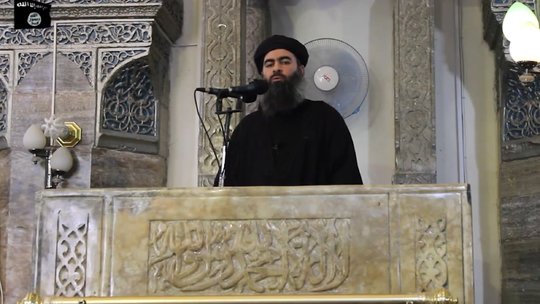 A look at Abu Bakr al-Baghdadi, the leader of the Islamic State in Iraq and Syria, a militant group that now rivals Al Qaeda in power and popularity. Video Credit By Mona El-Naggar and Sofia Perpetua on Publish Date August 11, 2014. Image Credit-/Agence France-Presse � Getty Images[/caption]
A look at Abu Bakr al-Baghdadi, the leader of the Islamic State in Iraq and Syria, a militant group that now rivals Al Qaeda in power and popularity. Video Credit By Mona El-Naggar and Sofia Perpetua on Publish Date August 11, 2014. Image Credit-/Agence France-Presse � Getty Images[/caption]NEW YORK (AP) -- A brutal terrorist organization that calls itself a state but lacks recognition from any government will take center stage when more than 140 heads of state and government convene for the annual ministerial meeting of the U.N. General Assembly this week.
The head of the so-called Islamic State, a man called Abu Bakr al-Baghdadi, has not been invited. But the danger posed by his jihadi army will be the overriding theme for an international community horrified by its atrocities in Iraq and Syria, along with a growing concern about random beheadings or larger terror attacks at home inspired by militants abroad.
"Together, we will address the horrendous violence in Syria and Iraq, where conflict and governance failures have provided a breeding ground for extremist groups," U.N. Secretary-General Ban Ki-moon told a news conference last week.
With world leaders grappling to stitch together a coalition and plan of action, Ban said he hopes the General Assembly session will help produce an international consensus to act against the al-Qaida breakaway group, which U.S. intelligence officials estimate has up to 31,000 fighters including some 12,000 foreigners.
On the sidelines of the global gathering, President Barack Obama will lead a summit meeting of the Security Council to focus on one aspect of the threat - foreign terrorist fighters.
A draft resolution expected to be adopted by the 15-member council would require all countries to prevent the recruitment and transport of would-be foreign fighters preparing to join terrorist groups such as the Islamic State. It would also require the 193 U.N. member states to ensure that their domestic laws and regulations punish their nationals who travel - or attempt to travel - to another country to plan or carry out terrorist acts, and it threatens sanctions against recruiters and financiers for al-Qaida associated groups.
Torbjorn Soltvedt, principal analyst for the Middle East and North Africa at risk advisory company Maplecroft, said the U.N. General Assembly presents an opportunity for the U.S. to consolidate and expand its coalition against the Sunni extremist Islamic State group.
"But while Obama may be able to broaden the coalition and secure additional commitments from allies, the session is unlikely to fundamentally impact the scope and nature of military operations in Syria and Iraq," he said.
The Islamic State group was established in Iraq but spread in early 2013 to Syria, where it grew in the chaos of that country's civil war. Its fighters rampaged across northern and western Iraq in June, seizing a huge swath of land and sending tremors across the Middle East.
The group now controls territory stretching from northern Syria to the outskirts of Baghdad. The militants have established what they call an Islamic state, or caliphate, ruled by their harsh interpretation of Islamic law. They have made no effort to hide their brutality, publicizing videos that show them killing their captives, including beheading two American journalists and a British aid worker.
But the complexities and conflicting loyalties inherent in the Middle East present major obstacles to achieving the international coalition Obama is trying to assemble to contain and ultimately eradicate the extremist group.
Several key Sunni-ruled Arab countries, for various reasons, are reluctant to join. Moreover, the U.S. has rejected cooperating with two clear enemies of the Islamic State group: Syrian President Bashar Assad and his fellow Shiite ally Iran. For its part, Iran has also ruled out military coordination with the United States.
The U.S. ambassador to the United Nations, Samantha Power, said Sunday that more countries were pledging support for the fight against Islamic State group militants. However, she would not name them or detail their level of support. Power said more than 40 countries have spoken in support of the campaign against the militants, and they will announce their own plans in their own time.
Iranian Foreign Minister Mohammad Javad Zarif described nations participating at a recent conference in Paris to hammer out an alliance against the Sunni extremists as "a coalition of repenters." He said that most nations there had supported the Islamic State group "in one form or another," starting with al-Qaida's emergence in Iraq following the U.S. invasion in 2003.
At the end of the day, he said, they created "a Frankenstein that came to haunt its creators."
He didn't name any coalition members, but many believe supporters in Saudi Arabia and Qatar have provided financing to the Islamic State group, and Turkey has allowed thousands of foreign fighters to cross into Syria and Iraq to join the militants.
These regional Sunni powerhouses are reluctant to make a direct move that would be seen as aligning with the Shiite leaderships in Baghdad and Damascus and their Iranian backers.
It is this mix of rival powers and ideologies that will come together in New York this week at the General Assembly, and while back-door dealings are common in Middle East diplomacy, it is unclear whether the meeting will help smooth out differences.
"Conflicting agendas and mutual suspicion between key actors, such as the U.S., Iran and Saudi Arabia, will be difficult to overcome," Soltvedt said. "Despite the shared interests of world and regional powers in neutralizing the threat posed by the Islamic State, an effective joint effort by all concerned parties is unlikely."
By The Associated Press
The Iran Project is not responsible for the content of quoted articles.










